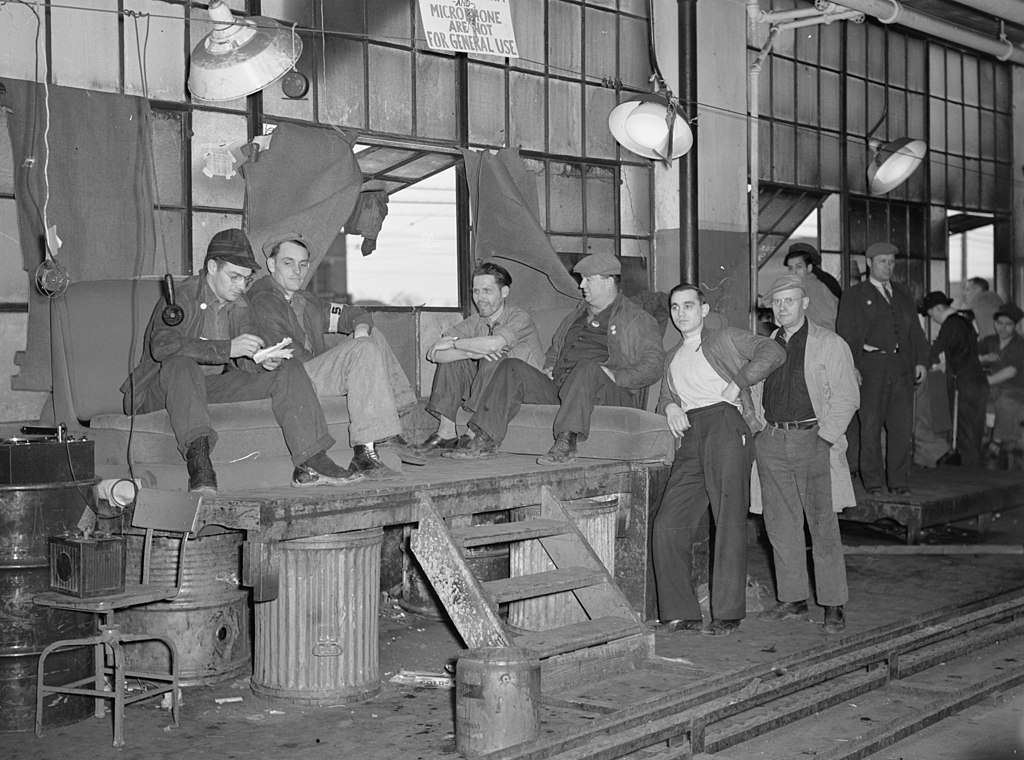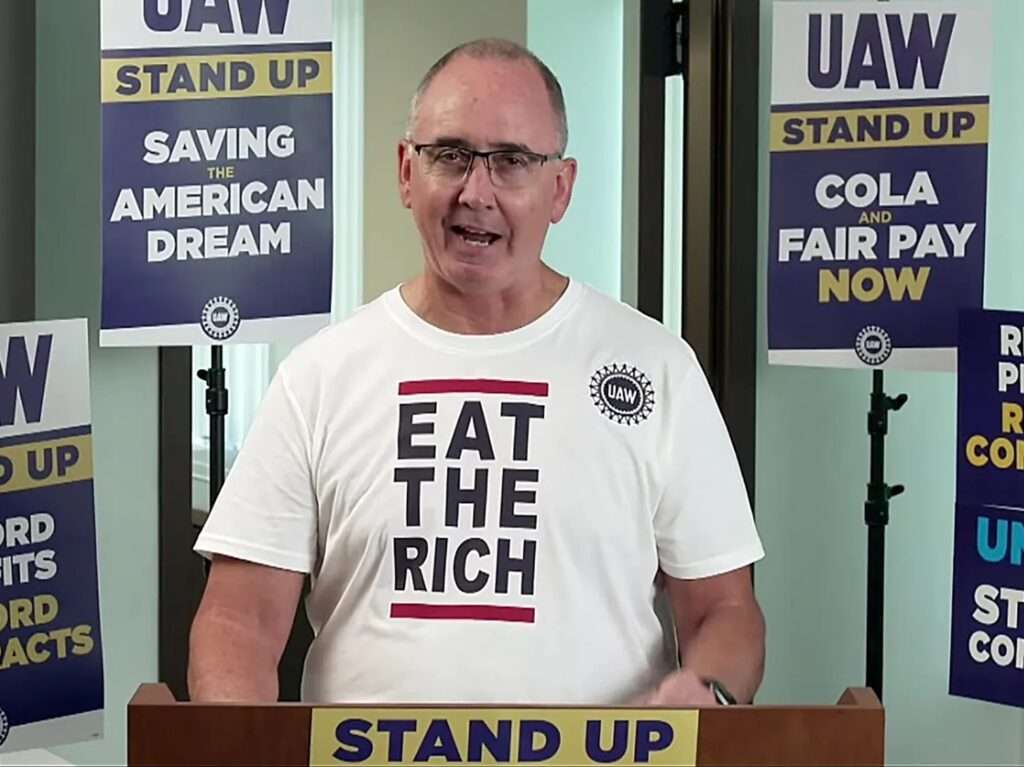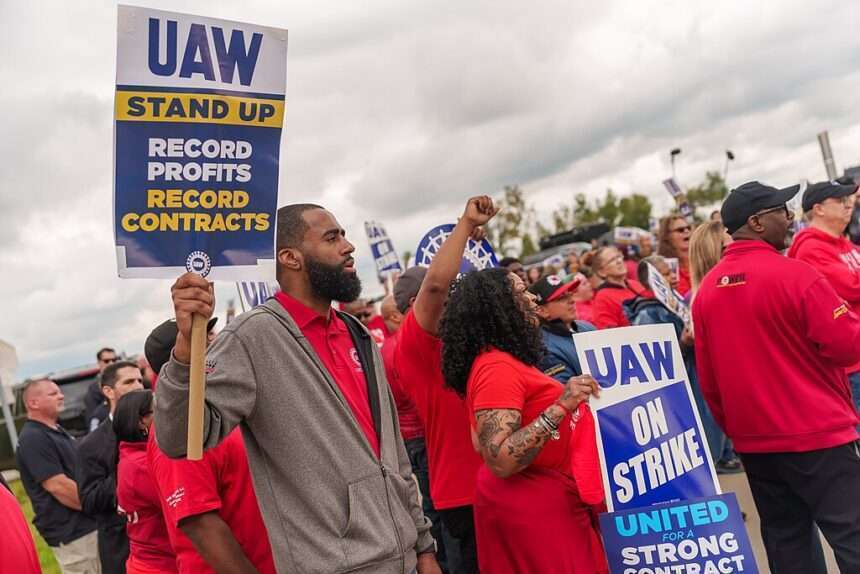UAW picket line at GM Willow Run Distribution Center in Belleville, Michigan. Photo credit: White House/Adam Schultz
JTA celebrates the recent wins of the United Auto Workers (UAW). We are excited to witness an overall resurgence in the Labor movement, and we see the successful strike against “the Big 3” automakers (Ford, General Motors, and Stellantis) as an excellent example of a new path forward and a great hope for renewed grassroots organizing.
With this historic strike, the UAW emerges victorious after a long period of losses. In recent memory, workers still feel the pain of the aftermath of auto industry bailouts in 2008-2009. Not only did feckless industry executives receive free money from the federal government, but they took advantage of the precarious situation to compel workers to agree to a bad contract that included a two-tiered wage system in which workers hired after 2007 were paid far less and were denied healthcare and pension benefits. At that time, workers had been told that they must make sacrifices for the survival of the industry. But those sacrifices continued to be enforced in subsequent contracts, and since 2019, workers have received a meager 6% wage increase, while CEO pay at the Big 3 has gone up an average of 40% and together the corporations are making record profits.
When the contract ended on September 15th, the union went on a long overdue offensive, with a “stand up strike” strategy that began with 13,000 workers shutting down sites owned by all three of the largest automakers. They expanded their activities each week, a steady escalation that demonstrated aggressive rank-and-file power, discipline, and strategy. Mutual aid from neighbors and local businesses sustained the strikers, and the media paid attention. The companies did not know which plants would be hit next, but they knew that the union would not stop until their demands were met. This increasing threat proved to be very effective, and after 41 days on strike, with a peak of over 45,000 workers on strike in 46 sites across 22 states, all of the Big 3 negotiators caved.
The UAW demanded substantial pay increases and cost-of-living adjustments (COLA), pensions for all workers and an end to the two-tier system, a 32 hour week, as well as the right to strike against plant closures (threats of closing and/or offshoring are the corporations’ strongest leverage). They also insisted on new rules that will make it easier to initiate organizing campaigns in electric vehicle and battery facilities.
They won almost every single demand. UAW negotiators touted their success: “Like the agreements with Ford and Stellantis, the GM agreement has turned record profits into a record contract. The deal includes gains valued at more than four times the gains from the union’s 2019 contract. It provides more in base wage increases than GM workers have received in the past 22 years.”

Strikers guarding window to prevent entry by scabs and police. Flint, Michigan 1937. Photo credit: Sheldon Dick
This strike has opened a new chapter in a story that had been very demoralizing for the Labor movement for decades. Although the UAW, founded in 1935, had won a strong reputation as a fighting union and pioneered the “sit down strike” strategy to combat openly violent employers, and had opened space for other unions to successfully fight for large wage increases and pensions, even positively influencing the pay and benefits of non-union workers employed by companies afraid of what might happen if their industries began to organize, the end of the post-war economic boom in the 1970s changed the dynamics of power. With growing unemployment and offshoring encouraged by free trade agreements, the UAW conceded many of their gains under threats of plant closures. Companies often closed the plants anyway, fueling a vicious cycle that decimated many unions. Meanwhile, the UAW’s dominant Administration Caucus began over 70 years of openly corrupt one-party rule. They rewarded only loyalty to the caucus as they colluded with corporate executives to neuter rank-and-file power, serving as a kind of Trojan Horse that brought the corporate agenda into the heart of the union. As a result, membership peaked in 1979 at 1.5 million but now stands at less than 400,000. In 2017-2020, a series of indictments against union leaders who had been shown to have embezzled over a million dollars of union dues, in addition to being nestled cozily in the pockets of their supposed “class enemies,” dramatically rocked the UAW and the entire Labor movement. The federal government threatened to put the union into trusteeship, which surely would have been the final nail in the coffin for this once proud and powerful organization. Instead, a different proposal by the dissident organization Unite All Workers for Democracy (UAWD), which seeks to create “a more democratic and accountable union,” was accepted and began to change the union for the better with a democratic “one member, one vote” campaign. New President Shawn Fain is the first to be elected by popular vote, and throughout the union, workers are impressed and empowered by the fact that he is “just a normal dude.”

Shawn Fain updates UAW members and the public on the status of the negotiations. Photo credit: UAW
Shawn Fain has taken a much more radical stance, eschewing three piece suits and total secrecy for an “Eat The Rich” t-shirt and regular public updates about the negotiation process. He loudly speaks out against “corporate greed” and “price gouging,” and demolishes the corporate argument about “jobs vs the environment” by advocating a just transition toward a sustainable economy and unionization of the growing EV industry: “Corporate America is not going to force us to pick between good jobs and green jobs.” The UAW has undergone tremendous changes in a very short time – Fain began serving his term in March of 2023, and the unprecedented strike began only 6 months later.
The climate movement has also undergone radical changes in recent years. The argument about “jobs vs the environment” is now widely seen as rubbish, as explained by our allies at the Labor Network for Sustainability. “For the transition off fossil fuels to succeed, it’s imperative that it is a just transition that can convince millions of people to take the leap of faith into the new green economy,” said Joshua Dedmond, co-director of LNS in a press statement. Membership organizer Sydney Ghazarian warned, “A clean energy transition where CEOs pocket billions in profit from taxpayer subsidies while simultaneously breaking union power and pushing workers into economic insecurity is a pathway to political backlash.” She continued, referencing the often disparaging mainstream media narrative, “The UAW does not oppose electric vehicles, and the cumulative effect of this misleading coverage is that, when it comes to the environment, the companies seem like forces of progress, while workers are portrayed as backwards. This framing can only assist the Big 3 executives, which are no doubt eager to peel liberal support away from the strike.” Workers are also very clear about not buying the corporate media line. Chris Viola of UAW Local 22 and UAWD said, “To be honest, I’ve actually noticed that environmentalists are supportive of the auto workers. They’re not taking the bait.”
Perhaps the time is ripe for a powerful grassroots push for a Green New Deal. President Biden visited UAW picket lines, posing for photo ops that will surely help his election (recent polling shows that 75% of Americans support striking workers). But the UAW has so far refused to endorse Biden without seeing some kind of substantial action. They understand that the Democratic Party is equally beholden to corporate interests and is responsible for many of the free trade agreements that have done so much damage to democracy and community power. Time will tell how effectively growing Labor power allied with increasingly fierce climate justice resistance can pressure politicians to shift their allegiances back toward the people.
“GM has agreed to lay the foundation for a Just Transition.” – Shawn Fain, UAW President
Meanwhile, many non-union workers, especially those in the EV and battery plants, are looking forward hoping that this successful strike will once again instill fear in the companies and lead to an overall improvement in working conditions across the automotive industry. This detail is crucially important to the struggle for just transition. Automakers have been claiming that they cannot pursue EV production while also paying good wages, that they need these record profits and government subsidies in order to risk new ventures, and that health and pension benefits, safe workplaces, and the right to strike will force them to move their operations overseas. But in reality, corporations have been making unilateral decisions to shelve EV technology, exploit low-wage workers in other countries, and undermine worker power for decades, even when the UAW and many other unions were acquiescing to their every demand. Now the strikers have clearly shown that business-as-usual will no longer be tolerated.
These contracts will expire on April 30, 2028. Fain said, “We demanded a longer contract because one of our biggest goals coming out of this historic contract victory is to organize like we have never organized before. When we return to the bargaining table in 2028, it won’t just be with the Big Three, but with the Big Five or Big Six.”
The UAW is calling on all workers to begin preparing now, aligning strategies and campaigns for the next four and a half years, so that we can all band together on May 1st – International Workers Day – to demand real transformative change. Fain declared, “If we’re going to truly take on the billionaire class and rebuild the economy so that it starts to work for the benefit of the many and not the few, then it’s important that we not only strike, but that we strike together.”
This historic win is a positive sign for the future of the Labor movement. With public sentiment swinging overwhelmingly pro-union, especially among younger generations, this decade will present many opportunities to once again build grassroots power and fight back against corporate rule and toxic trespass. As we have said, it is high time for organized Labor to reclaim its place as an active leader of popular struggles for social and environmental justice. The UAW is at the cutting edge of this resurgence, and we are pleased to see that they are not only fighting for their members, but also advocating for human rights by calling for a ceasefire in Gaza.

Unions demonstrate, calling for ceasefire in Gaza. Photo credit: Democracy Now!
JTA recommends that everyone in the US, whether unionized or not, demand that their local, state and federal governments divert subsidies away from fossil fuels and affiliated corporations and toward incentives for real local solutions that provide healthy local food, sustainable zero waste economies, and energy democracy. The manufacture of personal EVs (highly polluting, because they are made from plastic, steel, and rare earth minerals), along with enormous profits to CEOs and corporate shareholders, is currently being funded by billions of taxpayer dollars – even more so since the Inflation Reduction Act, the so-called “largest investment in reducing carbon pollution in US history” which experts say will significantly increase oil and gas extraction. We could be making so much more progress by diverting those subsidies to zero-emission public transit, abundantly available to everyone everywhere for free. Buses and trains can provide not only good union jobs in the manufacturing sector but also for drivers and maintenance workers, and everyone will see substantial health and quality of life benefits, especially in overburdened communities.
We are already seeing a shift toward this vision. The city of Albuquerque recently announced that all public transit will now be completely fare-free. JTA Executive Director Jose Bravo says, “This is the Just Transition we need as a country to seriously make a huge dent in carbon emissions. It would be a giant step in the right direction and bring millions of jobs to the whole country.”

